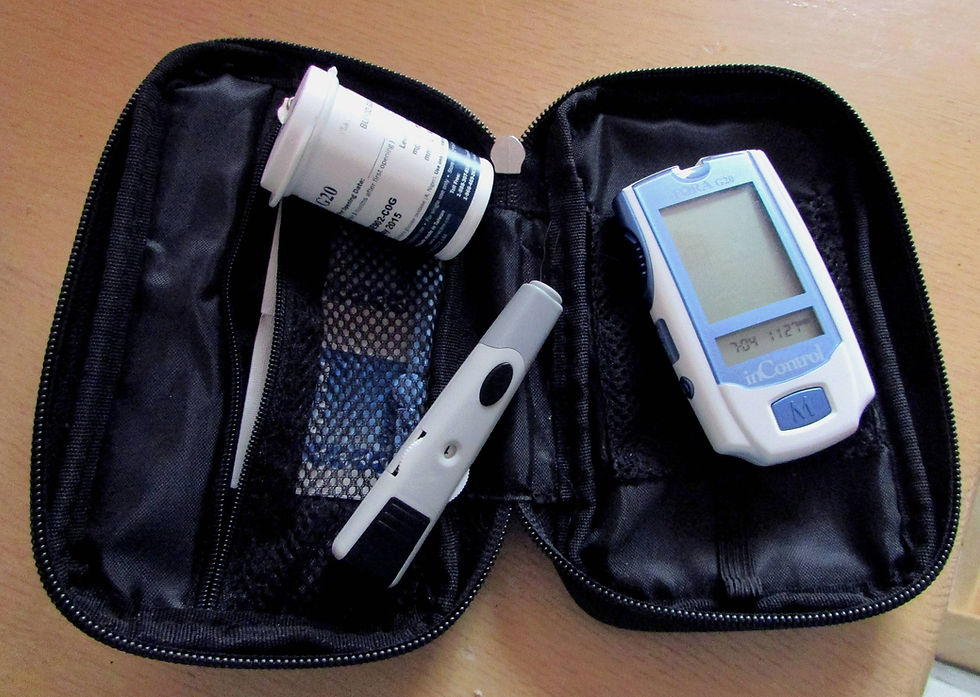Ketones: Understanding This Metabolic Fuel
- Don
- Jan 17
- 3 min read
Ketones are a type of molecule produced by the liver when the body doesn't have enough glucose for energy. This metabolic state is called ketosis. While often associated with the ketogenic diet, ketosis can occur naturally under certain conditions.
How Ketones are Produced:
Glucose Shortage: When glucose levels are low (such as during fasting or a very low-carbohydrate diet), the body turns to alternative fuel sources.
Fat Breakdown: In the absence of sufficient glucose, the liver breaks down fatty acids into ketones.
Ketone Bodies: The primary ketone bodies produced are:
Acetoacetate: The most abundant ketone body.
Beta-hydroxybutyrate: The most abundant ketone body in the blood.
Acetone: Excreted through breath and urine.
Ketosis vs. Ketoacidosis:
It's crucial to distinguish between physiological ketosis and ketoacidosis:
Physiological Ketosis: A natural metabolic state that occurs when the body adapts to low carbohydrate availability. It is generally safe and can provide various health benefits.
Ketoacidosis: A serious metabolic complication, often seen in uncontrolled type 1 diabetes. It occurs when the body produces too many ketones, leading to a dangerous buildup of acids in the blood.
Potential Benefits of Ketosis:
Weight Loss: Ketosis can promote weight loss by reducing appetite and increasing fat burning.
Improved Blood Sugar Control: Ketosis can help regulate blood sugar levels in individuals with type 2 diabetes.
Increased Energy Levels: Many people report increased energy and mental clarity while in ketosis.
Neurological Benefits: Some studies suggest that ketones may provide neuroprotective benefits and improve cognitive function, particularly in conditions like Alzheimer's disease.
Reduced Inflammation: Ketosis may help reduce inflammation in the body.
The Ketogenic Diet:
The ketogenic diet is a very low-carbohydrate, high-fat diet designed to induce ketosis.
Key Principles: Typically, the ketogenic diet consists of 70-80% fat, 20-25% protein, and 5-10% carbohydrates.
Food Choices:
High-Fat Foods: Fatty fish, avocados, nuts, seeds, olive oil, coconut oil, butter, and healthy oils.
Protein Sources: Meat, poultry, fish, eggs, and dairy.
Low-Carbohydrate Vegetables: Leafy greens, broccoli, cauliflower, and asparagus.
Limitations: The ketogenic diet can be restrictive and may not be suitable for everyone. It's crucial to consult with a healthcare professional or registered dietitian before starting any restrictive diet.
Potential Side Effects of Ketosis:
"Keto Flu": Common initial side effects include fatigue, headache, nausea, and difficulty concentrating. These usually subside within a few days as the body adapts.
Nutrient Deficiencies: Restricting certain food groups can lead to deficiencies in essential vitamins and minerals.
Digestive Issues: Some people may experience constipation or diarrhea.
Kidney Stones: Increased ketone production can increase the risk of kidney stones in some individuals.
Testing for Ketosis:
Blood Ketone Meters: These devices measure the level of beta-hydroxybutyrate in the blood.
Urine Ketone Strips: These strips change color to indicate the presence of ketones in the urine.
Important Considerations:
Individualized Approach: The optimal ketogenic diet can vary significantly from person to person.
Medical Supervision: If you have any underlying health conditions, such as diabetes, kidney disease, or liver disease, it's crucial to consult with a healthcare professional before starting a ketogenic diet.
Sustainable Lifestyle: The long-term success of any diet depends on its sustainability. Choose a ketogenic approach that you can realistically maintain over time.
Conclusion:
Ketones are an important alternative fuel source for the body. While the ketogenic diet has gained significant popularity, it's crucial to understand its potential benefits and risks. If you're considering a ketogenic diet, it's essential to consult with a healthcare professional or registered dietitian to ensure it's safe and appropriate for you.





Comments